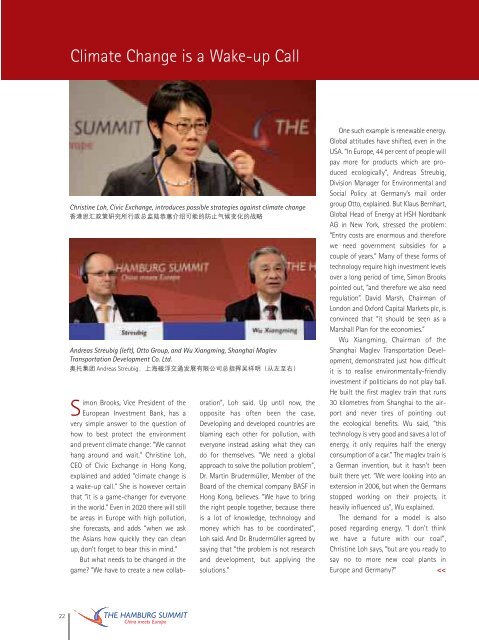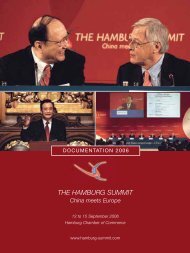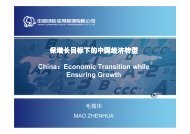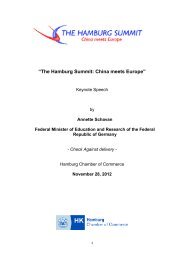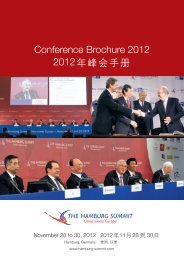Documentation Brochure - Hamburg Summit
Documentation Brochure - Hamburg Summit
Documentation Brochure - Hamburg Summit
You also want an ePaper? Increase the reach of your titles
YUMPU automatically turns print PDFs into web optimized ePapers that Google loves.
Climate Change is a Wake-up CallChristine Loh, Civic Exchange, introduces possible strategies against climate changeAndreas Streubig (left), Otto Group, and Wu Xiangming, Shanghai MaglevTransportation Development Co. Ltd.Simon Brooks, Vice President of theEuropean Investment Bank, has avery simple answer to the question ofhow to best protect the environmentand prevent climate change: “We cannothang around and wait.” Christine Loh,CEO of Civic Exchange in Hong Kong,explained and added “climate change isa wake-up call.” She is however certainthat “it is a game-changer for everyonein the world.” Even in 2020 there will stillbe areas in Europe with high pollution,she forecasts, and adds “when we askthe Asians how quickly they can cleanup, don’t forget to bear this in mind.”But what needs to be changed in thegame? “We have to create a new collaboration”,Loh said. Up until now, theopposite has often been the case.Developing and developed countries areblaming each other for pollution, witheveryone instead asking what they cando for themselves. “We need a globalapproach to solve the pollution problem”,Dr. Martin Brudermüller, Member of theBoard of the chemical company BASF inHong Kong, believes. “We have to bringthe right people together, because thereis a lot of knowledge, technology andmoney which has to be coordinated”,Loh said. And Dr. Brudermüller agreed bysaying that “the problem is not researchand development, but applying thesolutions.”One such example is renewable energy.Global attitudes have shifted, even in theUSA. “In Europe, 44 per cent of people willpay more for products which are producedecologically”, Andreas Streubig,Division Manager for Environmental andSocial Policy at Germany’s mail ordergroup Otto, explained. But Klaus Bernhart,Global Head of Energy at HSH NordbankAG in New York, stressed the problem:“Entry costs are enormous and thereforewe need government subsidies for acouple of years.” Many of these forms oftechnology require high investment levelsover a long period of time, Simon Brookspointed out, “and therefore we also needregulation”. David Marsh, Chairman ofLondon and Oxford Capital Markets plc, isconvinced that “it should be seen as aMarshall Plan for the economies.”Wu Xiangming, Chairman of theShanghai Maglev Transportation Development,demonstrated just how difficultit is to realise environmentally-friendlyinvestment if politicians do not play ball.He built the first maglev train that runs30 kilometres from Shanghai to the airportand never tires of pointing outthe ecological benefits. Wu said, “thistechnology is very good and saves a lot ofenergy, it only requires half the energyconsumption of a car.” The maglev train isa German invention, but it hasn’t beenbuilt there yet. “We were looking into anextension in 2006, but when the Germansstopped working on their projects, itheavily influenced us”, Wu explained.The demand for a model is alsoposed regarding energy. “I don’t thinkwe have a future with our coal”,Christine Loh says, “but are you ready tosay no to more new coal plants inEurope and Germany?”


